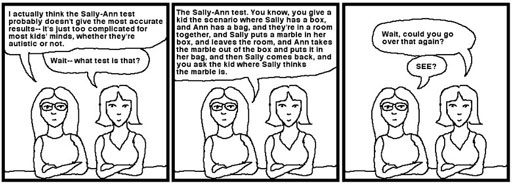4.3 Alternative ToM tasks
Although it has been used in many studies, the Sally–Anne task – and similar false belief tasks – have been widely criticised in the field (e.g. Bloom and German, 2000). For example, the simple pass–fail scoring protocol does not allow for the possibility of more subtle differences in children’s abilities. In addition, the Sally–Anne task requires levels of verbal comprehension, memory and other skills that younger children may not possess, and this, rather than a lack of ToM, may explain why they struggle to complete the task. Perhaps most importantly, the Sally–Anne task arguably focuses on only a narrow range of the complex skill set that allows us to read others’ feelings, beliefs, intentions and behaviours in real-life social interactions (Figure 7).
Such criticisms have led to the development of a host of alternative methods for exploring ToM. One example of this is using eye-tracking technology in order to explore the possibility that younger children have a partial understanding of ToM.
Another example of an alternative ToM task is based on a task battery developed by Tiffany Hutchins, Patricia Prelock and Wendy Chace (2008). Rather than a single false belief task with a simple right or wrong answer, this battery presents children with a series of tasks that tap varying aspects of their ability to ‘mind read’ and so yields a more nuanced score. The tasks are designed to vary in difficulty and to measure a wide range of skills and abilities associated with ToM dynamics as they are expressed in everyday settings.
Activity 9 Hutchins, Prelock and Chace’s ToM task battery
An example of one of the more complex tasks in Hutchins, Prelock and Chace’s ToM task battery is presented below.
Click on the forward arrow to begin the task. As you go through the slides, note down in the box below three skills or abilities that a child would need to have acquired in order to successfully complete the various elements of this task.
As you note your answers, think about how the abilities or skills you have identified allow us to read others’ minds and why this is believed to be such an important part of cognitive and social development.
Skill/ability 1:
Discussion
This task requires children to make judgements about peoples’ beliefs, desires and intentions. These judgements about other minds can be more or less complex. For example, first-order mental states are simply thoughts of the form ‘he thinks that …’, whereas second-order mental states take the form ‘he thinks that she thinks’. For children to give the correct responses in this task, they need some basic competence in this latter kind of mental reasoning.
Underpinning this ability to make accurate judgements about others is a whole raft of other social and cognitive abilities. For example:
- the linguistic ability to understand words such as ‘think’, ‘want’, and ‘feel’
- the ability to recognise different kinds of facial expressions and to link these expressions to underlying emotions
- the ability to recognise that people may be mistaken about what others believe.
As you can see, ToM is a complex and rich psychological phenomenon! Because of the range of abilities needed to complete this task successfully, it is important that these tasks are actually assessing ToM (validity) and not measuring something else (for example, linguistic skill or working memory). Even if we do not know fully why we are so good at predicting others’ mental states, the majority of us are (though, of course, that doesn’t mean we always get things right!).

